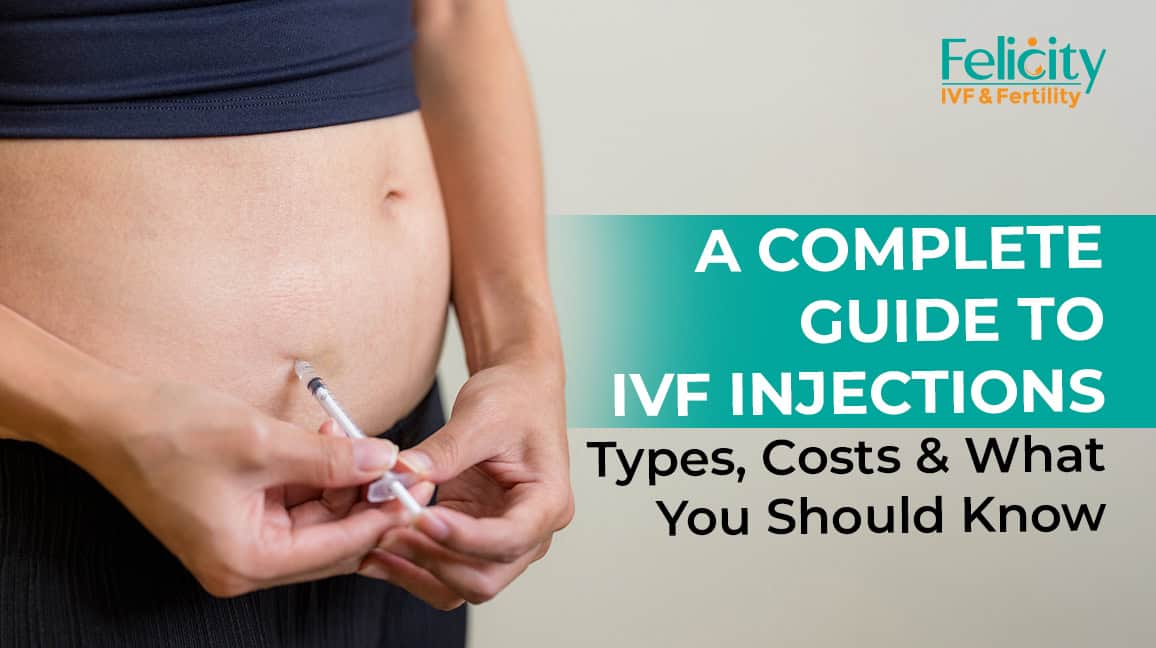A Complete Guide to IVF Injections: Types, Costs & What You Should Know

Also, starting IVF can be both exciting and intimidating at the same time. IVF injections are also one of the most discussed developments in this treatment technique. The hormonal medications form a core component of the procedure and are created to provide an optimal and stabilised view of your reproductive cycle to maximise your successful outcome. Being mentally informed about the goal of each injection, the IVF injection process, and what to expect will help you not to be anxious. This informational paper will take you through all the information that you require to know concerning these vital drugs.
What is the Purpose of IVF Injections?
IVF injection is a very important aspect of the treatment plan. The major IVF injection uses are to disrupt the natural process of the hormonal cycle of the body. Although the natural menstrual cycle involves the release of only a single mature egg, the aim of In-Vitro fertilisation is to obtain multiple mature eggs to heighten the chances of producing viable embryos. This is carried out by a method of well-timed injections which stimulate the ovaries, prevent premature ovulation and cause the ovaries to finally mature. These shots are what make IVF possible because, without them, the treatment would not be possible; they are the key in controlling the timing of the egg retrieval and preparation of the body in the event of pregnancy.
What are the Different Types of IVF Injections?
IVF injections. Injections are specific, and their choice is dependent on the treatment plan. There are several types. The various IVF injections names included in the process can be understood and help demystify the process.
Ovarian Stimulation Injections: This is one of the first groups of injections you will have to take. They include such hormones as follicle-stimulating hormone (FSH) and luteinising hormone (LH), which activate the ovaries to produce several follicles. Daily administration of these kinds of injections takes place over 8-14 days.
GnRH Agonists or Antagonists: These are administered to prevent premature or spontaneous ovulation. When you are using a compound such as Cetrotide or Ganirelix, it will inhibit the actual LH surge in order to allow the eggs to be collected before the release.
The “Trigger Shot”: This is called the Trigger Shot and is an injection which is administered about 34-36 hours before the time of the injection. It has the human chorionic gonadotropin (hCG) that stimulates the complete maturation of the eggs. The ultimate success of the procedure depends on the proper timing of this shot.
Lunar Phase Support: Often, women are put on progesterone after the egg is harvested and after the implantation of the embryo in the form of injections or pessaries. Injections to help get pregnant help to support the uterus to enable it to provide a favourable environment that enables embryo implantation and a good early pregnancy.
What Are the Potential Side Effects?
Just as with any other medicine, IVF injections do have side effects. These are usually very slight and manageable. The IVF injections’ side effects experienced by many people are a drop in blood pressure and nausea.
Bloating and Abdominal Discomfort: It is also expected that the ovaries enlarge and produce multiple follicles, causing bloating and abdominal discomfort.
Mood Swings and Fatigue: The emotional changes can be experienced during the hormonal fluctuation, and this can cause a person to become irritable or experience fatigue.
Injection Site Reactions: Red spots, bruises, or soreness at the area of injection are also normal. The discomfort can be reduced by rotating the sites of the injections given.
On unfortunate occasions, a worse phenomenon known as Ovarian Hyperstimulation Syndrome (OHSS) may occur. This is the reason that clinics put their patients under close observation during the IVF injection process to keep them safe and also adjust the dosages accordingly.
How Does the IVF Injection Process Work?
The process of IVF injection is well-planned. It starts with an initial consultation and a thorough fertility plan of action by the fertility specialist. You will be trained on how to administer the injections by yourself, and these injections are usually subcutaneously injected (under the skin), so they are quite easy to do at home.
Throughout the process of stimulation, the clinic will conduct frequent monitoring sessions with you. The job of these appointments includes having blood checks to ensure that your hormone levels are good and transvaginal ultrasounds to evaluate your follicle growth. Depending on these findings, your physician will determine how many of the IVF injections you will receive. The last procedure is the trigger shot, which is timed so that eggs can be ready to be retrieved.
How Much is the IVF Injection Cost in India?
The IVF injection cost in India can vary widely, and it depends on a number of factors. The kind of medication that you will need, the amount your doctor will prescribe and the duration of the treatment cycle will be factors towards this. The expensive aspect of these injections is that they constitute a good portion of the IVF treatment cost. Make sure you discuss with your clinic all the estimated costs of the cycle, including the medication, before initiating your cycle. Some clinics include the prices of the medication to make it easier to calculate the funds needed.
Can I Self-Administer IVF Injections?
Injections are scary to most people, and it is only natural to feel that way. Most of the IVF injections, however, are subcutaneous and are not administered by inpatient nurses but by people at home. Your clinic will train a person well enough on how to prepare the contents, where to administer, and how to dispose of used needles. The needles used are very fine, and most patients find that the process also gets much easier as practice is done. In some cases, a more painful intramuscular injection (such as some forms of progesterone) may be required, and your partner or a friend may need to assist you.
What Should I Do If I Miss an Injection?
When you are using IVF injections, it is important to stick to the prescribed regimen as much as possible. Missing an injection can also have an impact on your cycle and may also impact the results. In case you become aware of the fact that you missed a dose, you should visit your fertility clinic. They will tell you what is the best thing to do. You should not go for a second dose, and you should not attempt to obtain make-up doses without consulting your doctor, as this may possibly become dangerous.
Felicity IVF: A Final Word on the IVF Injection Process
Injections that go along with the IVF process may appear intimidating, but the process is practical and triumphant when faced with fertility conception. Being aware of the causes and varieties, as well as the side effects that these medicines might create, can help you feel more in charge of the situation. You should also keep in mind that every injection takes you a step forward to your desired end. Emotional support from your partner, friends, and relatives is priceless during this period, as well as the professional help of your fertility team.
We also appreciate the issues and sentiments attached to this process at Felicity IVF & Fertility Clinic. We are focused on delivering patient-centred, caring service, and we will share all of the important lessons with you, including how to give your initial injection, as well as the victories. We are confident that educated patients will be empowered patients, and we will do our best to ensure that you will feel knowledgeable and empowered as you move through the entire process.
FAQs
IVF injections are hormonal medications used to regulate and stimulate the reproductive cycle. They are necessary to produce multiple eggs for retrieval, prevent premature ovulation, and prepare the uterine lining.
The IVF injection process varies. Ovarian stimulation injections are taken for 8-14 days, followed by a single trigger shot. Injections to help get pregnant, such as progesterone, are taken daily for several weeks after embryo transfer.
Common IVF injection side effects include bloating, abdominal discomfort, mood swings, fatigue, and tenderness at the injection site. These are usually mild and manageable.
